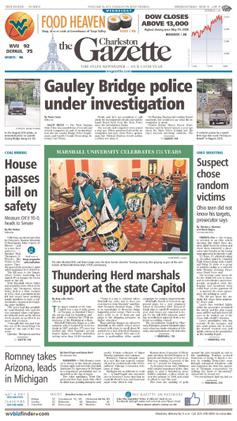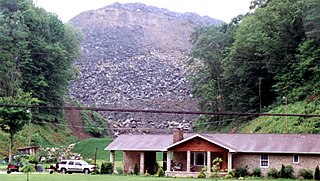Related Research Articles

Mountaintop removal mining (MTR), also known as mountaintop mining (MTM), is a form of surface mining at the summit or summit ridge of a mountain. Coal seams are extracted from a mountain by removing the land, or overburden, above the seams. This process is considered to be safer compared to underground mining because the coal seams are accessed from above instead of underground. In the United States, this method of coal mining is conducted in the Appalachian Mountains in the eastern United States. Explosives are used to remove up to 400 vertical feet of mountain to expose underlying coal seams. Excess rock and soil is dumped into nearby valleys, in what are called "holler fills" or "valley fills".

Massey Energy Company was a coal extractor in the United States with substantial operations in West Virginia, Kentucky and Virginia. By revenue, it was the fourth largest producer of coal in the United States and the largest coal producer in Central Appalachia. By coal production weight, it was the sixth largest producer of coal in the United States.

The Sago Mine disaster was a coal mine explosion on January 2, 2006, at the Sago Mine in Sago, West Virginia, United States, near the Upshur County seat of Buckhannon. The blast and collapse trapped 13 miners for nearly two days; only one survived. It was the worst mining disaster in the United States since the Jim Walter Resources Mine disaster in Alabama on September 23, 2001, and the worst disaster in West Virginia since the 1968 Farmington Mine disaster. It was exceeded four years later by the Upper Big Branch Mine disaster, also a coal mine explosion in West Virginia, which killed 29 miners in April 2010.

The Farmington Mine disaster was an explosion that happened at approximately 5:30 a.m. on November 20, 1968, at the Consol No. 9 coal mine north of Farmington and Mannington, West Virginia, United States.

The Battle of Blair Mountain was the largest labor uprising in United States history and is the largest armed uprising since the American Civil War. The conflict occurred in Logan County, West Virginia, as part of the Coal Wars, a series of early-20th-century labor disputes in Appalachia.
Denise Giardina is an American novelist. Her book Storming Heaven was a Discovery Selection of the Book-of-the-Month Club and received the 1987 W. D. Weatherford Award for the best published work about the Appalachian South. The Unquiet Earth received an American Book Award and the Lillian Smith Book Award for fiction. Her 1998 novel Saints and Villains was awarded the Boston Book Review fiction prize and was semifinalist for the International Dublin Literary Award. Giardina is an ordained Episcopal Church deacon, a community activist, and a former candidate for governor of West Virginia.
Elliott E. "Spike" Maynard was an American lawyer and former judge from West Virginia. In 1996 he was elected as a Democrat to the Supreme Court of Appeals of West Virginia. A judge of West Virginia's 30th Judicial Circuit for over 16 years, he was elected as a Democrat to a 12-year term on the Supreme Court of Appeals of West Virginia in 1996.

Julia "Judy" Belle Thompson Bonds was an organizer and activist from the Appalachian Mountains of West Virginia, United States. Raised in a family of coal miners, she worked from an early age at minimum wage jobs. Bonds was the director of Coal River Mountain Watch (CRMW). She has been called "the godmother of the anti-mountaintop removal movement."
James Howard Harless, better known as Buck Harless, was an American coal and timber operator and philanthropist, who was renowned in the area of his hometown of Gilbert, West Virginia, for his extensive contributions to schools, churches, healthcare and education programs.

The Charleston Gazette-Mail is a non-daily morning newspaper in Charleston, West Virginia. It is the product of a July 2015 merger between The Charleston Gazette and the Charleston Daily Mail. It is one of nine papers owned by HD Media. It publishes Tuesday-Saturday, with the Saturday paper being dated "Weekend", with updates on its website on Sundays and Mondays.
Spruce 1 is a proposed coal strip-mining operation approximately two miles northeast of Blair in Logan County, West Virginia, in the Appalachian Mountains. First proposed in 1997 by Arch Coal Inc. of St. Louis, the operation was first to cover 3,113 acres (12.60 km2), then reduced to 2,278. The permitting process was closely monitored by environmental groups and the mining industry alike with regard to the Obama administration's future mining policy.
Climate Ground Zero (CGZ), founded in February 2009, is a non-violent civil disobedience campaign against mountaintop removal mining based in the southern coalfields of West Virginia. According to their website, Climate Ground Zero believes “that the irrevocable destruction of the mountains of Appalachia and its accompanying toll on the air, water, and lives of Appalachians necessitates continued and direct action". The organization seeks to end mountaintop removal mining by drawing attention to the issue through protests involving trespass on the property of mining companies. By locking down to machinery on mine sites, occupying trees in the blast zone, or blockading haul roads to mine sites, protesters associated with Climate Ground Zero directly interfere with mining practices. Other protests draw attention to the alleged negligence of regulatory agencies such as the West Virginia Department of Environmental Protection (WVDEP) or the federal Environmental Protection Agency (EPA) by occupying the offices of these governmental organizations. Climate Ground Zero has been referenced in the New York Times, Los Angeles Times, Washington Post, Democracy Now, and the Associated Press.
The Last Mountain is a feature-length documentary film directed by Bill Haney and produced by Haney, Clara Bingham and Eric Grunebaum. The film premiered at the 2011 Sundance Film Festival and went into general release on June 3, 2011. The film explores the consequences of mining and burning coal, with a particular focus on the use of a method for coal strip-mining in Appalachia commonly known as mountaintop removal mining.
Larry Gibson was an anti-mining environmentalist from West Virginia, who spent the majority of his adult life opposing mountaintop removal coal mining in the area, specifically at Kayford Mountain. He was president of the Keeper of the Mountains Foundation and lifetime member of the Sierra Club. He also was a board member for the Ohio Valley Environmental Coalition.

The Hobet 21 Coal Mine in West Virginia was operational between 1974 and 2015. Straddling the border of Boone County and Lincoln County in the Appalachian Mountains, the Hobet 21 mine was one of the largest mountaintop-removal coal mining operations in West Virginia. Originally owned by Fil Nutter, the mine used both underground mining and strip mining techniques, and later even more intensive surface mining using a dragline. Increasing productivity and profitability encouraged workers to successfully strike for their health plan in 1993, which resulted in unusually thorough coverage for mine workers at this time. The Hobet mine was incorporated into Arch Coal in 1997, along with several other mines, following booming coal demand. The mine was sold two more times: to Magnum Coal in 2005 and to Patriot Coal in 2008. Patriot Coal subsequently went bankrupt in 2015, and the Hobet site was passed into a Virginia-based conservation firm who continued to mine the land while reclaiming and planting trees to offset carbon emissions for other companies.

Environmental justice and coal mining in Appalachia is the study of environmental justice – the interdisciplinary body of social science literature studying theories of the environment and justice; environmental laws, policies, and their implementations and enforcement; development and sustainability; and political ecology – in relation to coal mining in Appalachia.

Environmental issues in Appalachia, a cultural region in the Eastern United States, include long term and ongoing environmental impact from human activity, and specific incidents of environmental harm such as environmental disasters related to mining. A mountainous area with significant coal deposits, many environmental issues in the region are related to coal and gas extraction. Some extraction practices, particularly surface mining, have met significant resistance locally and at times have received international attention.

David George Zatezalo is an American coal industry executive who served as the Assistant Secretary of Labor for Mine Safety and Health in President Donald Trump's administration, where he headed the Mine Safety and Health Administration.
Eric Eyre is an American journalist and investigative reporter, best known for winning the Pulitzer Prize in investigative reporting for exposing the opioid crisis in West Virginia. He was a statehouse reporter for the Charleston Gazette-Mail. He resigned his position in April 2020. He is also the author of the book, Death in Mud Lick: A Coal Country Fight Against the Drug Companies That Delivered the Opioid Epidemic.
Mike Pushkin is the chair of the West Virginia Democratic Party and a Democratic member of the West Virginia House of Delegates representing District 37 since 2014. He is also a taxi driver and musician, taking passengers or playing as a guitarist for his band "600 Lbs of Sin!" when the legislature is not in session. Pushkin authored the original legislation to impeach the Justices of the Supreme Court of Appeals of West Virginia.
References
- ↑ "Our Team".
- ↑ "SEJ First Amendment task force". Society of Environmental Journalists website. Retrieved 2006-05-16.
- 1 2 3 "Ken Ward, Jr". Nieman Watchdog . Retrieved October 23, 2013.
- ↑ "Ken Ward Jr. - Fellowship year: 2006". Alicia Patterson Foundation. Retrieved May 1, 2019.
- ↑ "Ken Ward Jr". MacArthur Foundation. October 4, 2018. Retrieved October 4, 2018.
- ↑ "Gazette-Mail's Ward receives MacArthur Fellowship". Charleston Gazette-Mail. October 4, 2018. Retrieved October 4, 2018.